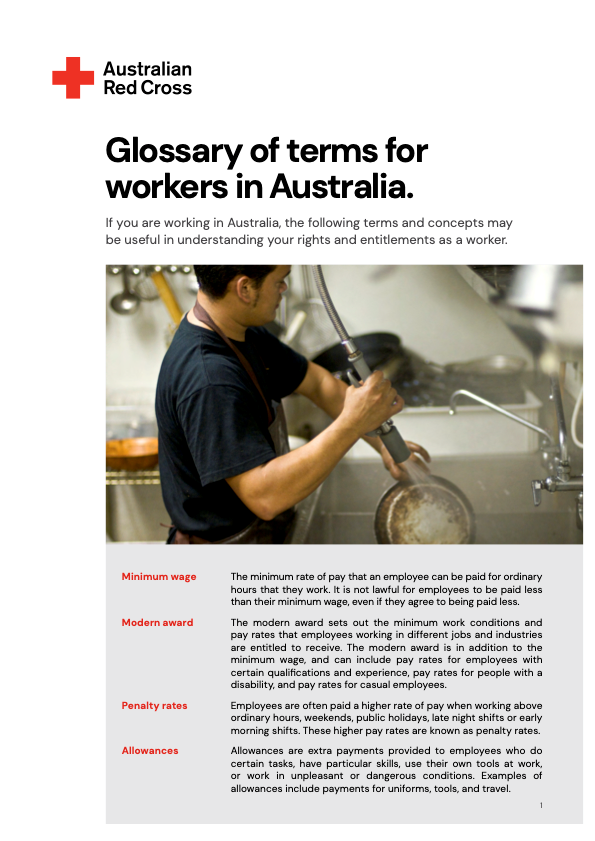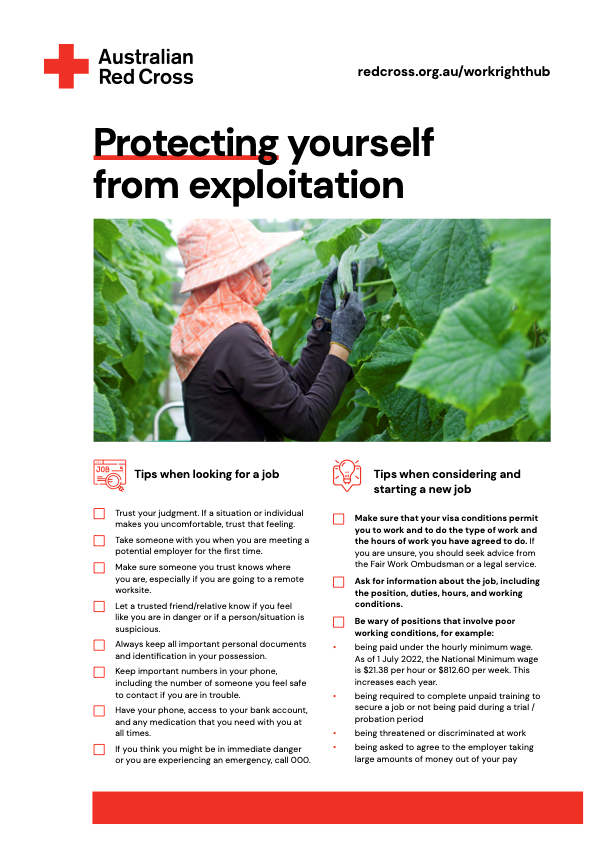Know your rights

You should be treated fairly and safely at work in Australia
All workers in Australia have basic rights that are protected by law. These laws cover all workers, regardless of your length of stay in Australia or your visa type. All employers must follow rules which include:
- The hours you are requested to work.
- How much you should be paid.
- How often you need to take a break.
It is important to know:
- Your boss must follow workplace laws including if you are on a temporary visa and/or from overseas.
- Your boss cannot threaten to deport you or cancel your visa.
- Casual and part-time workers also have rights at work.
- You have the same rights at work even if your boss is a friend or member of your community.

In Australia, there are different types of workers with different rights and obligations. It is important to know whether you are an employee or an independent contractor. This may depend on your individual circumstances.
Employees
Full-time employees usually work on average 38 hours each week. They are usually employed on a permanent basis or a fixed term contact (employed for a specific period of time or task).
Part-time employees work less than 38 hours per week, but their hours are usually regular each week. They are usually employed on a permanent basis or a fixed term contact.
Casual employees do not have a commitment to ongoing work with an agreed pattern of work. For example, their roster changes each week to suit the employer’s needs and they can refuse or swap shifts.
Shift workers work shifts and get an extra payment for working shift hours.
Independent contractors
Independent contractors (also called contractors or subcontractors) provide an agreed service under a contract for those services. They usually negotiate their own fees and working arrangements and can work for more than one client at a time. They usually have an ABN and submit invoices for the service they provide.
Sham contracting
When an employer tells an employee they must work as an independent contractor, when they really are an employee, this is called sham contracting. Employers might tell an employee they are an independent contractor, so they do not have to pay them for their entitlements as an employee (for example a minimum wage). Sham contracting is against the law.

In Australia, there are minimum wages and working conditions. All employees must at least get a minimum wage (minimum rate of pay) when working in Australia. Employers cannot pay you below this amount, regardless of your visa, age or experience. Sometimes you might get paid for working overtime, on weekends or at night. Your boss must give you a pay slip which needs to show how much you have been paid.
You must be paid for the work you do, including if you are on a trial or need to do training for your job. You need to be paid in money, not in goods and services like food, clothing or accommodation.
You can use this pay calculator to see how much you should be paid based on the work you do.
Deducting pay
If an employer takes money out of an employee’s pay before it is paid to them, it is called a deduction. Employers can only do this in some situations. Your boss cannot deduct money from your pay if it benefits the boss and is unreasonable.

You have the right to work in a healthy and safe environment. Your boss must look after your health and safety at work. Your boss or supervisor must:
- show you how to do your job safely
- make sure there is someone to watch out for you
- not ask you do anything that needs a special licence, like drive a car, a crane or forklift if you don’t have the right licence
- have the right tools or equipment for you to do your job safely
- give you safety equipment if you need it to do your job.
If you get hurt or injured at work, you may be able to get workers’ compensation to pay for medical treatment and support until you get back to work. Remember to ask your boss as soon as possible and fill out any forms you need to apply for workers’ compensation.

In the workplace you are protected against:
- Discrimination
- Bullying
- Sexual harassment
Discrimination is treating someone unfairly because of their age, race, nationality, gender, disability, religious or political beliefs.
Bullying is persistent and repeated negative behaviours directed towards someone that creates a risk to their health and safety (mental or physical). For example, publicly humiliating someone, spreading rumours or gossip or verbal abuse.
Sexual harassment is unwelcome conduct of a sexual nature and is likely to offend, humiliate or intimate. For example, sexual comments or jokes, unwelcome touching, sending sexual emails or text messages.
The law protects people from discrimination, bullying and sexual harassment at work. You have the right to make a complaint if you feel you have been discriminated against, sexually harassed or bullied at work.
Want to know more about your rights at work in Australia?
The Fair Work website has information in over 30 languages to help you understand your basic workplace rights and entitlements. You can read information online or watch short videos.
The Safe Work Australia website has resources and information in over 20 languages to help you understand work health and safety and worker’s compensation in Australia.

